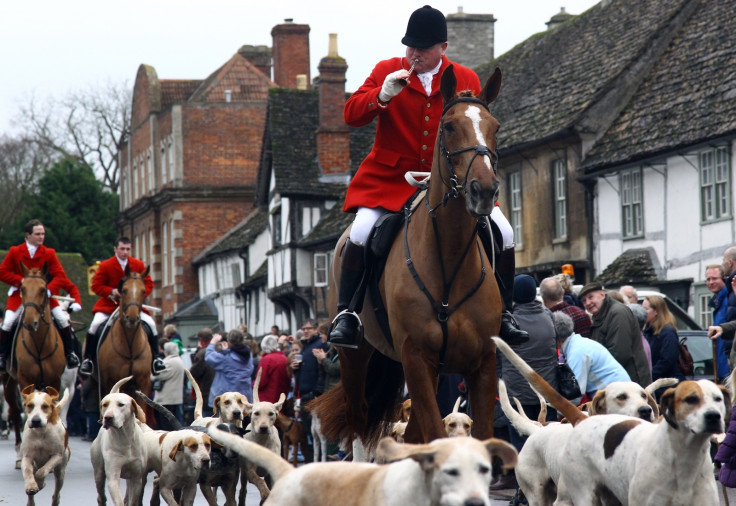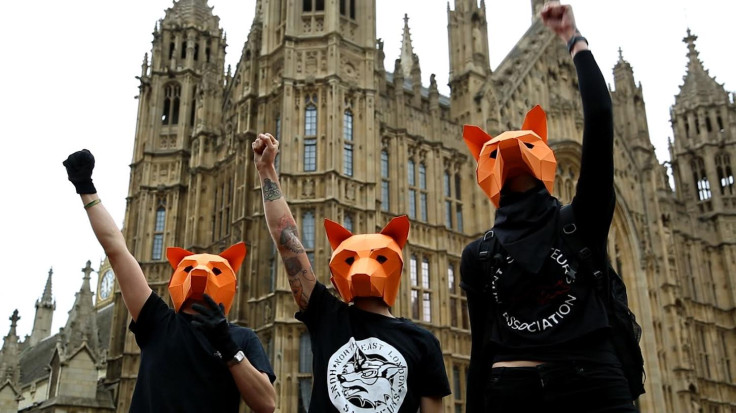Boxing Day Hunt: Thousands of spectators in the UK are expected to watch 'barbaric' bloodsport

More than a quarter of a million people are expected to turn out to support the traditional Boxing Day hunt, according to pro-hunting organisation the Countryside Alliance. Around 300 registered hunts take place around the UK, using trail hunting – where a trail is laid – so hounds can follow the hunted prey.
According to Tim Bonner, chief executive of the Countryside Alliance, "the Hunting Act is in tatters". The organisation found not a single registered hunt had been successfully prosecuted this year, according to a Telegraph report.
"It was never about foxes or animal welfare but rather an attempt to eradicate hunts and the communities that surround them.
"After 11 years of the act, support for hunts is as strong as ever and the Hunting Act is mostly being used to prosecute poaching offences."
The organisation's 2015 survey also found 80% of registered hunts had held onto their supporters or recruited new ones since the ban. Moreover, 91% hunt the same number of days, or more, each season, with 85% of hunts having the same number or more hounds over the last 11 years.
The English country gentleman galloping after a fox – the unspeakable in full pursuit of the uneatable.
Oscar Wilde
Fox hunting increasing in popularity
The Boxing Day hunt in the New Forest has had to find a bigger venue this year. The New Forest Hounds (NFH) spokesman Graham Ferris said the new location – Bolton's Bench, near Lyndhurst – would make it easier to manage the large crowds anticipated.
He told the Daily Echo: "We usually get a big attendance at the Boxing Day meet and don't see why this year should be any different. Hopefully holding the meet at Bolton's Bench will help us separate the riders and hounds from the people with pushchairs, children and dogs and thus stop them getting all mixed in together."
The NFH has survived the change in the law by staging trail-hunting, with hounds chasing an artificial scent, rather than fox urine. Hundreds of spectators are expected to attend the gathering at 10.45am on Saturday 26 December to watch the start of the hunt at 11am. "For a lot of people seeing the hounds turn out on Boxing Day is part of their Christmas," Ferris said.

Calls for an end to fox hunting
The RSPCA has called the practice of using hounds to chase and kill live animals "barbaric". A spokesman said: "Eleven years on from the Hunting Act the message is loud and clear. Hunting with dogs is a thing of the past and should stay that way."
One of the key players in the battle to get hunting with dogs banned is the League Against Cruel Sports. A spokesman said: "Behind this festive façade lies a sinister and brutal reality. Hunting is an excuse for people to torture animals for their own pleasure. Foxes endure bites to their flanks and hindquarters that cause them enormous suffering before death – all in the name of sport."
Tom Quinn, director of campaigns for the League Against Cruel Sports, said: "The vast majority of people in this country are opposed to fox hunting as they find it a pathetic remnant of the dark ages which serves no practical purpose other than to amuse a small, cruel but influential minority."
The Hunting Act explained
The Hunting Act 2004 came into force in February 2005 under Tony Blair's Labour government, which controlled the hunting of wild mammals with dogs and prohibited hare coursing. It was stated in the High Court Judgement of February 2009 that the statutory aim of the Hunting Act "is to prevent or reduce unnecessary suffering to wild mammals" and that "causing suffering to animals for sport is unethical and should, so far as practicable and proportionate, be stopped".
In the UK, 80% of people think fox hunting should remain illegal
Ipsos Mori, December 2014
It is not an absolute ban on the hunting of wild mammals with dogs and some hunting is permitted under the act. The High Court Judgement stated that it "recognised the need to... control wild mammals which farmers and others are entitled to regard as pests". There are several classes of permitted or exempt hunting which are listed under Schedule 1. However, each type of exempt hunting has a number of conditions that must be adhered to if the hunting is to be lawful.
The Conservatives pledged in their 2005 and 2010 manifestos to offer a free vote on the act. During the summer, a government attempt to change the legislation ended in failure when it became apparent that most MPs still support the act in its current state.
David Cameron stated on 3 March 2015 that he hoped to repeal the ban in the future. The British Prime Minister was once a member of Heythrop Hunt in Oxfordshire. He wrote in the Countryside Alliance magazine: "I have always been a strong supporter of country sports. It is my firm belief that people should have the freedom to hunt, so I share the frustration that many people feel about the Hunting Act and the way it was brought in by the last government."
History of fox hunting
In England, the custom is thought to date back to the 1500s. Hunting with hounds was popular in Celtic Britain, even before the Romans arrived. Norman hunting traditions were brought to Britain when William the Conqueror arrived.
Foxes were referred to as beasts of the chase by medieval times, and the earliest known attempt to hunt a fox with hounds was in Norfolk, England, in 1534, where farmers began chasing foxes down with their dogs for the purpose of pest control. The first use of packs specifically trained to hunt foxes was in the late 1600s.
In Germany, hunting with hounds was first banned on the initiative of Hermann Göring on 3 July 1934. In 1939, the ban was extended to cover Austria after Germany's annexation of the country. Bernd Ergert, the director of Germany's hunting museum in Munich, said of the ban: "The aristocrats were understandably furious, but they could do nothing about the ban given the totalitarian nature of the regime."
© Copyright IBTimes 2025. All rights reserved.






















